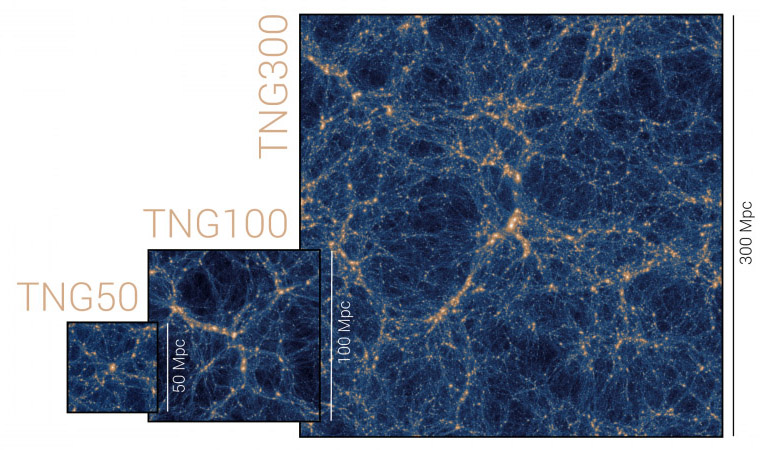Welcome
The IllustrisTNG project is an ongoing series of large, cosmological magnetohydrodynamical simulations of galaxy formation. TNG aims to illuminate the physical processes that drive galaxy formation: to understand when and how galaxies evolve into the structures that are observed in the night sky, and to make predictions for current and future observational programs. The simulations use a state of the art numerical code which includes a comprehensive physical model and runs on some of the largest supercomputers in the world. TNG is a successor to the original Illustris simulation and builds on several years of effort by many people. The project description page contains an introduction to the motivations, techniques, and early science results of the TNG simulations. The project includes three primary runs spanning a range of volume and resolution; these are called TNG50, TNG100, and TNG300.
Development for the TNG model and simulations was started in 2014, and the first production simulation (TNG100) started two years later in 2016 with the finalization of the model. The original plan of three large-volume cosmological boxes was achieved in 2019 with the completion of TNG50. Since 2017 the collaboration, as well as a large group of public data users, have published a number of papers on results across a diverse set of topics within the fields of galaxy formation, evolution, and cosmology.
In 2020 and onwards a number of spin-off projects have begun, extending the original TNG suite beyond its original scope and goals. These include simulation suites for machine learning applications, cosmological parameter inference, radiation-hydrodynamics for cosmic reionization, extremely large Gpc-class cosmological volumes with hydrodynamics and galaxies, and the most massive galaxy clusters.
Stay tuned for more!
-The TNG Collaboration
